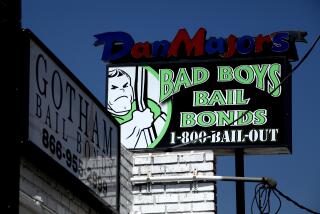1-Day, 1 Trial; Will Reform Help or Hurt?
- Share via
California recently adopted a law requiring courts to select prospective trial jurors on their first day of jury duty, or excuse them for the rest of the year. Prospective jurors in Los Angeles County currently are required to appear for 10 consecutive days.
The new law, to be implemented by Jan. 1, 2000, faces resistance from local court officials, who say it is too costly and will result in a lack of eligible jury prospects. Those in favor of the measure say it will reduce the jury service burden and should be implemented as written.
DIANE WEDNER asked an attorney, a court official and a Valley resident recently summoned for jury duty about the merits and pitfalls of the new law.
ROBERT KROPP
Attorney with Geffner and Bush in Burbank
I believe the new law will increase the likelihood that people will choose to serve on a jury. Many people’s perception of jury duty is that they spend their time watching TV and reading newspapers in the assembly room, and don’t get seated on a panel. It’s been my experience that people aren’t negative about serving on a jury; they’re negative about the waiting process.
Perhaps now the people who are summoned will think, “I won’t have to sit there for 10 days,” and they won’t throw their notices away. When I’m approached by people who want a way out of jury duty, I tell them I believe it’s their duty to serve, and that truthfully, there aren’t many ways to get excused from a panel. Most of the people I talk to say jury duty is a financial burden; their employers will pay for only 10 days, whether the trial lasts that long or not. Others say their employers won’t pay at all. So it’s not surprising that people don’t want that long commitment.
You tend to find now that juries often consist largely of retirees, public employees or people who can afford it. What’s interesting about this prospect is that if you get more people showing up, you’ll get a greater variety of people serving on juries.
LYNNE GOLD
Assistant Chief, Northwest District, Van Nuys Superior Court
*
This [new law] is something we’ve wanted to do. We want happy people serving. The difficulty, however, is the size of this county, which is the largest in the nation. We summon more than 300,000 people a year, often with 500 people a day in the system. With this new law, we may have difficulty supplying the demand for jurors. If a juror comes in one day, goes through orientation--which they must do before entering the courtroom--and then isn’t picked for a panel that day, they’re gone for the year. The advantage of the current 10-day system is that it allows us to place them on call for, let’s say, two days, then we can call them back. They’re ready for trial.
Under the new system, this one-day obligation will be tough for us. We may have to summon four times the number of [prospective] jurors we currently use to fill the jury pool. Our statistics reflect that we get only a 25% yield from the summons. The new law limits what we can accomplish in terms of the time we get to put the jurors in the courtroom. It’s going to be costly in many ways.
The California Judicial Council, which will determine whether Los Angeles County can be exempt from the new law, is reasonable. Perhaps they need to try some ideas in between the 10-day and the one-day limit and see how they work.
GLORIA CARBONE
Writer, Sherman Oaks
*
I think that serving as a juror is a very valuable thing to do. I intend to serve when it’s more advantageous for me, when I don’t have to commit 10 days of my life to driving back and forth when I may not even get on a jury. One cannot take care of one’s children or plan around work or any other obligations under the current system. Also, for those whose employers don’t pay their employees for time spent on jury duty, it can be financially devastating. So I’d rather see a limit to the number of days that one would have to commit to waiting for a trial. Perhaps not as few as one day, because that’s too many people for the courts to have to process--with jurors in and out in such a short period of time--but maybe two or three days would be sufficient.
I believe the courts would get a larger pool of jurors who would be willing and able to serve if they shortened the obligation. Many people I know who have served have said it’s rewarding and they recommend it. It’s something most people are willing to do under the right circumstances.
More to Read
Sign up for Essential California
The most important California stories and recommendations in your inbox every morning.
You may occasionally receive promotional content from the Los Angeles Times.












